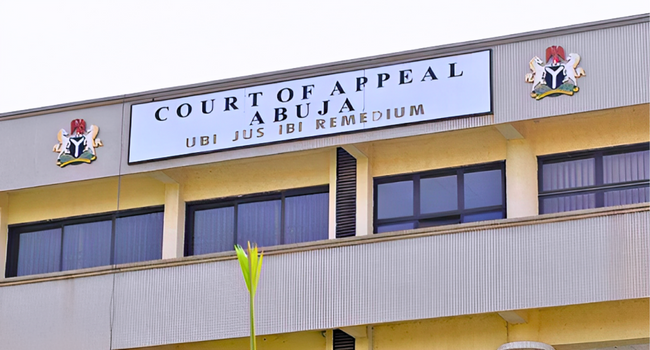The Court of Appeal sitting in Abuja, on Friday, descended heavily on the Independent National Electoral Commission (INEC), accusing it of displaying partisanship.
The court of appeals expressed concern over the Commission’s behavior, finding it embarrassing that the Commission could present itself in a manner favoring a party in an election dispute, even going so far as to disown documents it had not only issued but also properly certified.
It decried that the electoral body has continued to “dance naked in the market,” even though it was meant to assume a neutral stand in election litigations.
“The INEC as an institution should be reminded of its role in an election; to be an unbiased umpire between parties.”
“It should stop behaving irresponsibly, having in mind that its duty to conduct election has a direct bearing on peace and well-being of the country.”
“The role of INEC in election dispute should be limited to the tendering of all the documents used in an election and explaining what they were used for and how they were obtained.”
“INEC should stop dancing naked in the market, pretending that no one is seeing its nakedness and its dancing steps,” the court stated while delivering judgment in a Bauchi State House of Assembly election appeal.
Justice K. I. Amadi, delivering the lead judgment of a three-member panel, nullified the election of Abubakar Suleiman, the Speaker of the Bauchi State House of Assembly, who had been earlier declared the winner in Ningi Central Constituency by INEC.
In a unanimous decision, the court determined that the evidence presented established the inconclusiveness of the election. Beyond annulling the Certificate of Return issued to Suleiman, who contested under the Peoples Democratic Party (PDP), the appellate court instructed INEC to conduct a supplementary poll in 10 polling units within the state, to be completed within 90 days.
Additionally, the court imposed a cost of N500,000 against INEC.
The judgment resulted from an appeal presented to the court by Khalid Abdulmalik-Ningi, the candidate of the All Progressives Congress (APC) in the election.
INEC had announced that Suleiman, representing the Peoples Democratic Party (PDP), secured a total of 16,866 votes, surpassing his closest competitor, Abdulmalik-Ningi of the APC, who garnered 15,065 votes in the election held on March 18.
However, dissatisfied with the election’s outcome, the APC candidate filed a petition with the State Assembly Election Petition Tribunal.
The petitioner, among other claims, asserted that election results were nullified due to over-voting or corrupt practices.
Despite INEC, a respondent in the case, refuting the claim of over-voting, it failed to present any witnesses before the tribunal, resulting in the dismissal of the petition.
In critiquing the tribunal’s decision, the appellate court highlighted that the appellant brought forth nine witnesses who testified regarding various polling units. Additionally, certified copies of INEC documents were tendered in support of the case.
According to Section 137 of the Electoral Act 2022, the court affirmed that the certified INEC documents were sufficient to substantiate the allegation that the election did not adhere to legal provisions.
The court questioned why INEC denied the cancellation of results in certain polling units when its officials had confirmed the same in Forms EC 40G, which they signed and submitted.
It emphasized that the tribunal had the statutory authority to give evidentiary weight to the INEC documents, which, according to the court, contained all the necessary information to prove the alleged non-compliance.


